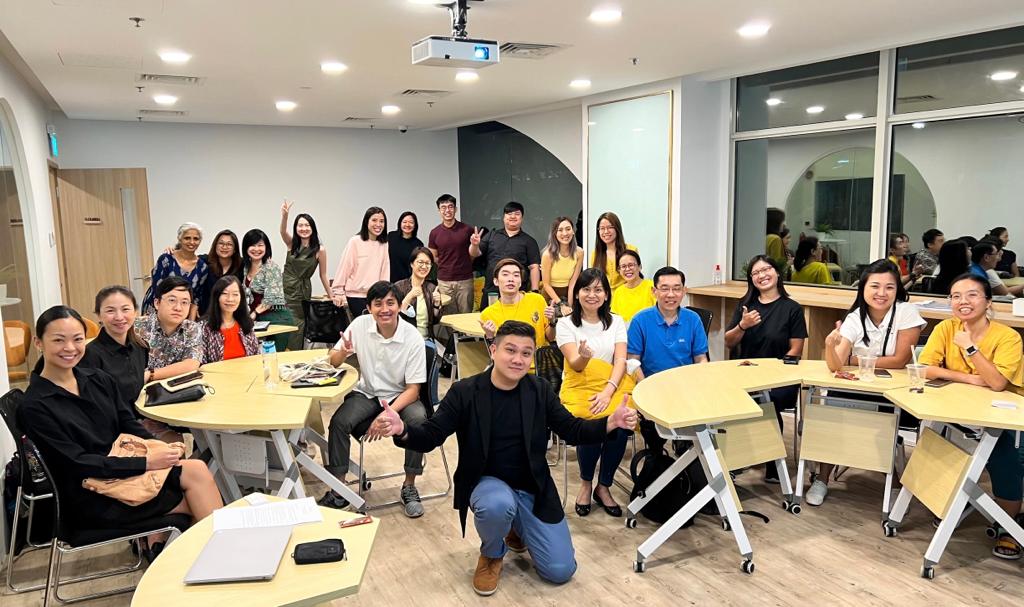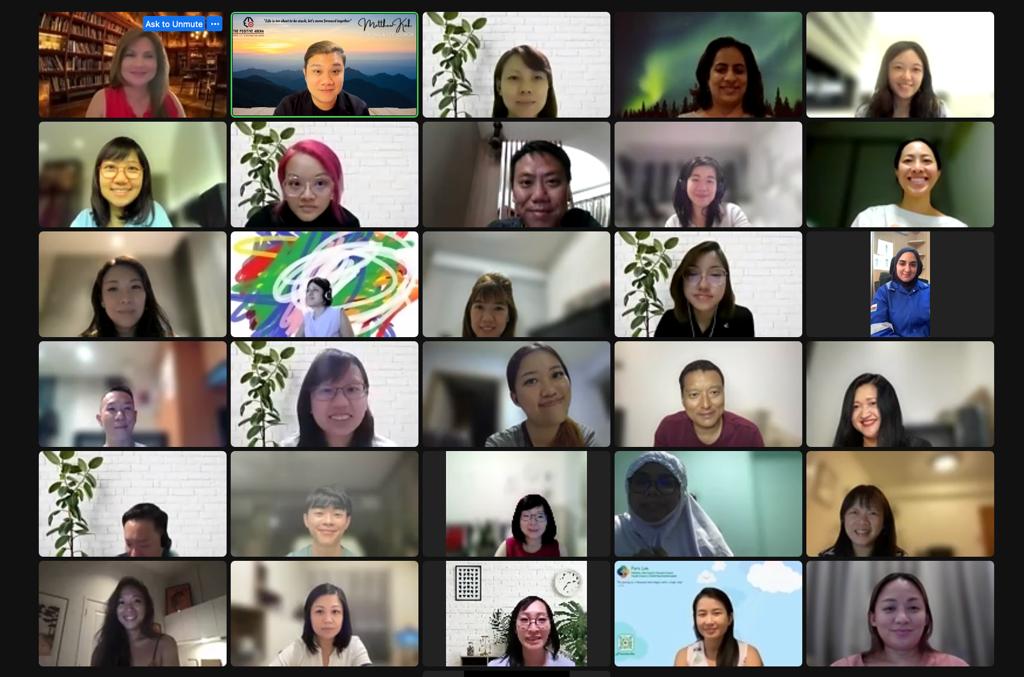Matthew shares with us the ways in which TSPP has equipped him with the skills to help others lead fulfilling lives. He has applied his learnings in both his personal and professional lives, and highlights how learning at TSPP has inspired him to make positive change in the lives of others.
Matthew Koh
CEO and founder of the Positive Arena
Adjunct Lecturer, TSPP
Graduate Diploma in Applied Positive Psychology, TSPP
Masters in Applied Positive Psychology and Coaching Psychology, University of East London
Q: Share a little bit about yourself and what you do.
I’m Matthew, the CEO and founder of the Positive Arena, where I provide training, coaching and consultancy services to improve the well-being of individuals, schools and organisations using Positive Psychology. I’m also currently one of the adjunct lecturers in The School of Positive Psychology (TSPP).
Before I joined TSPP, I was a Food Science lecturer in a tertiary institution and witnessed the increasing prevalence of mental illness among students. I believe this was what piqued my curiosity to understand whether there’s a preventative approach to mental illnesses. That was when I found out about Positive Psychology at the School of Positive Psychology, and subsequently signed up for the Graduate Diploma in Applied Positive Psychology in hopes of equipping myself with relevant knowledge and skills to help my students flourish within school settings.
Once I had completed my Masters, I knew that Positive Psychology was an area that I really want to specialise in and leverage on my teaching experience in a tertiary institution. That’s when I thought of coming back to TSPP as an adjunct lecturer to contribute to a field that I am very, very passionate about.

Q: What did you enjoy learning the most at TSPP?
We took quite a number of modules at TSPP, but I think what really left a deep impression on me was the Introduction to the Positive Psychology module. We learned about different wellbeing modules, such as the PERMA framework which represents positive emotions, engagement, relationships, meaning, and accomplishment. Besides learning the science and evidence-based research behind these models, I also learnt how to apply them into my daily life and use them to help my students better understand and improve their wellbeing.
Mindfulness Psychology was another module that stood out to me in particular. My initial impression of it was that it was about going for mindfulness practice, but it is actually so much more than that. We learnt about the research behind it, how the brain works when we engage in mindfulness. The intricacies of Mindfulness Psychology really appealed to me, and I brought back some of these things that I’ve learnt and incorporated them into school settings.
Q: Any teaching method or tools you think that’s useful for your learning or teaching?
I think the beauty of studying at TSPP is that you get to be a part of a lot of deep and engaging discussions with your peers. There are so many things you can learn from a group of like-minded people who are passionate about wellbeing. When the lecturers break out into groups to discuss and see how we can apply these concepts in our day-to-day living, I think that’s when we developed group learning and understood how wellbeing was perceived by each unique learner/individual.
Q: How did the programme help you with your life?
The programme has helped me get to know myself deeper on a personal level, especially regarding my character strengths. I have come to realise that I’m a unique individual with my own distinct strengths that I can use for my day-to-day living.
A significant changing factor was how I managed to incorporate this knowledge into schools to organise and hold wellbeing workshops for students and teachers, to help them learn effective tools and strategies to improve their wellbeing.
This entire process greatly motivated me and led me to discover greater meaning in life – I adopted a drive for betterment and self-discovery, and I realised that this is really what I want to do. This inspired me to set up my own company to provide wellbeing training programmes for the community, schools and organisations.

Q: How did TSPP help you in your career?
The Graduate Diploma in Applied Positive Psychology (GDAPP) builds a very strong foundation for me to understand the concepts of Positive Psychology. This immensely helped me when I progressed to becoming a practitioner, and when I went on to complete my Masters programme in Applied Positive Psychology and Coaching Psychology at University of East London.
My education in TSPP helped me to apply what I’ve learnt and gave me various opportunities to connect with other learners.
TSPP gave me the confidence to know what I’m doing, the root science behind wellbeing and optimal human functioning.
Q: Were there any life changing moments after attending TSPP?
In the past, prior to joining TSPP, I was someone who led my life based on the understanding that I don’t have much resilience — I was sceptical of my ability to bounce back in the face of challenges.
Learning the skills at TSPP has equipped me with essential skills in helping me manage my wellbeing in the face of adversity and preventing me from going into a downward spiral. I have integrated these techniques into my day-to-day living and it has really helped me flourish and thrive in my daily life.
Q: Would you recommend anyone to join TSPP?
I would definitely recommend it, especially for people who are keen to learn more about Positive Psychology. If you’re interested in deepening your knowledge, understanding the science behind optimal human functioning and learning how to apply these knowledge and skills to bring positive change to the lives of people around you, then I think you should sign up for this programme.

Q: How would you recommend prospects or people still on the fence about joining TSPP?
I think it’s really about the intent. What do you really hope to achieve after learning this? Because I always feel that when people sign up for GDAPP, they take wellbeing deeply into their hearts.
So it could be a form of self-development. Perhaps you are in a difficult season of your life and want to learn something to help yourself, to pick yourself up again and lead a flourishing life. Or maybe you are passionate about helping others, and want to learn tools that can help you make a positive impact in people’s lives, be it in the workplace or your personal life. If you have a strong desire to guide others in living flourishing lives, then TSPP is for you.
Q: Is there anything else that you wish to share or highlight?
When I was a lecturer in my initial years of teaching, I was very intrigued by pedagogy. I wanted to make my classes very engaging, exciting, and interesting. And I thought I have done my role as a teacher if a lot of my students did well academically.
But I think what shocked me was when I saw students who did very well academically lead lives that were not thriving or flourishing. They have depression, or they struggle with mental health issues. I also heard stories of how students, when they subsequently go into the workforce, couldn’t take the daily stressors which resulted in them leaving their jobs or professions. This was when I started asking myself in the purest sense, what is the definition of education? What are we really preparing our students for?
That was why I wanted to learn positive psychology. After I learned this, I went back to my school and conducted wellbeing workshops. I saw a change in how students became more resilient, how students were more connected with their own individual strengths, and even able to overcome their own challenges in their day-to-day lives as a student.
Q: If you’re a teacher or someone in the position to influence someone…
There will come a time when you meet students who are struggling, be it in their studies or in life, and we cannot avoid having difficult conversations with them.
If you struggle with handling these difficult conversations, I urge you to sign up for the Graduate Diploma in Applied Positive Psychology (GDAPP), where you learn about the signs of wellbeing and how to bridge the gap between you and your students.


